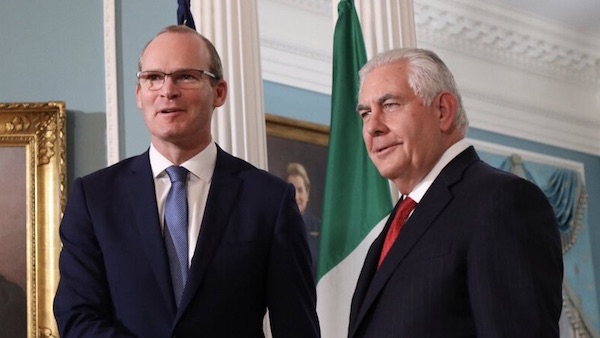
A concerted attack by British ‘Brexiteers’ to end Ireland’s famous 1998 peace deal may have motivated a US decision to appoint a new envoy to the north of Ireland.
Activity in London in the wake of the collapse of talks to restore powersharing in Belfast took an unusual turn this week when a number of right-wing political figures directly called for the Good Friday Agreement to be scrapped. Their criticism appeared motivated by fears the deal could pose an impediment to British withdrawal from the European Union.
In a weekend newspaper column, leading pro-Brexit MEP Daniel Hannan said his objections to the peace accord “were not on orange or green grounds but on democratic grounds”. Without irony, he declared: “It’s unhealthy to have the same people in office all the time.”
Former Tory Direct Ruler Owen Paterson and senior Labour Party figure Kate Hoey then claimed the Good Friday Agreement was “unsustainable” and had “outlived its use”.
Signs of an anti-GFA bandwagon have been emerging at Westminster ever since it became clear that the peace deal was incompatible with Brexit. A year ago, the London parliament voted to allow the British government renege on the Agreement as part of its negotiations to leave the European Union. The issue has come back into focus in recent weeks as it became central to Britain’s negotiations with the EU.
The US government has always been considered to be a force for the protection of the agreement since it was brokered by former US Senator George Mitchell. On Friday, US secretary of state Rex Tillerson (pictured, right) confirmed that the United States is again preparing to appoint a special envoy to the north of Ireland.
Responding to questions from reporters ahead of a meeting with the deputy prime minister in the 26 Counties, Tanaiste Simon Coveney, at the US state department in Washington, Mr Tillerson said: “We’re giving some names to the White House as we currently speak.”
The first US special envoy, Senator Mitchell, was appointed in 1995. Successive appointees, including Richard Haass and Gary Hart, have played a role in the talks process, but the position has remained unfilled since the election of Donald Trump.
This week a group of 22 members of the US Congress called on the Trump administration to appoint a special envoy to the region, as did the Ancient Order of Hibernians. It is thought one will be appointed ahead of the annual gathering of Irish politicians in the US for St Patrick’s Day.
“Obviously the St Patrick’s Day celebrations and events would be a great opportunity to bring some clarity there,” Mr Coveney said. He said the importance of US engagement was “less about Brexit and more about trying to ensure that political structures and the implementation of the Good Friday agreement continued to be bedded down”.
He warned that talking down the peace accord could undermine peace in the Six Counties. “It is not only irresponsible, but reckless and potentially undermines the foundations of a fragile peace process in Northern Ireland that should never be taken for granted,” he said.
Taoiseach Leo Varadkar claimed he was reassured by statements from British prime minister Theresa May and the British Direct Ruler in Ireland, Karen Bradley, reiterating their commitment to the agreement in recent days.
“They’ve said that they stand by the Good Friday Agreement and their support for it is steadfast,” he said. “You know, when I want to know what the United Kingdom government thinks, when there are a lot of mixed messages, I listen to the prime minister.”
![[Irish Republican News]](https://republican-news.org/graphics/title_gifs/rn.gif)
![[Irish Republican News]](https://republican-news.org/graphics/title_gifs/harp.gif)

